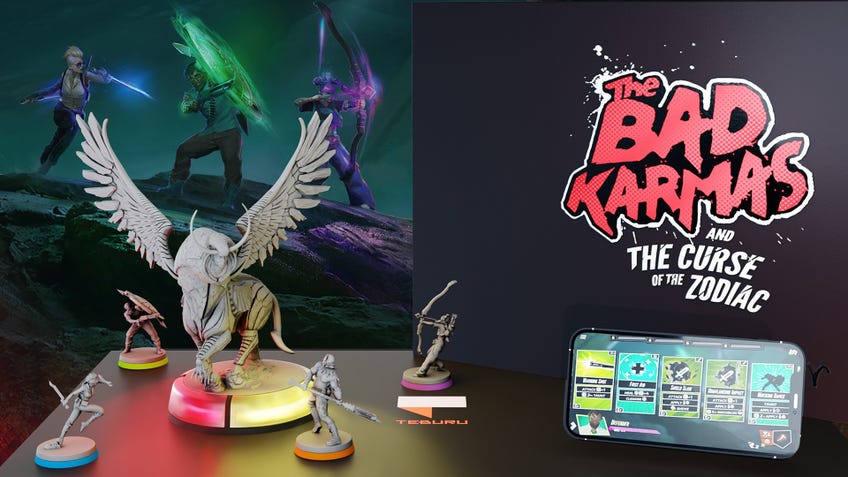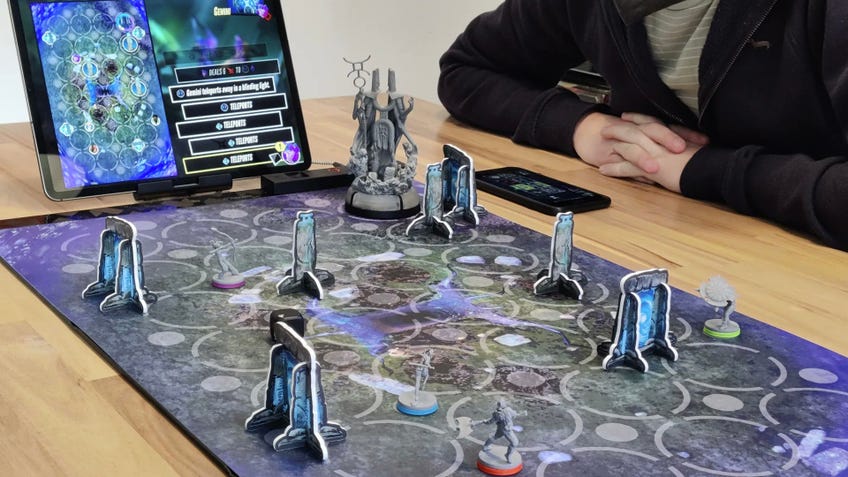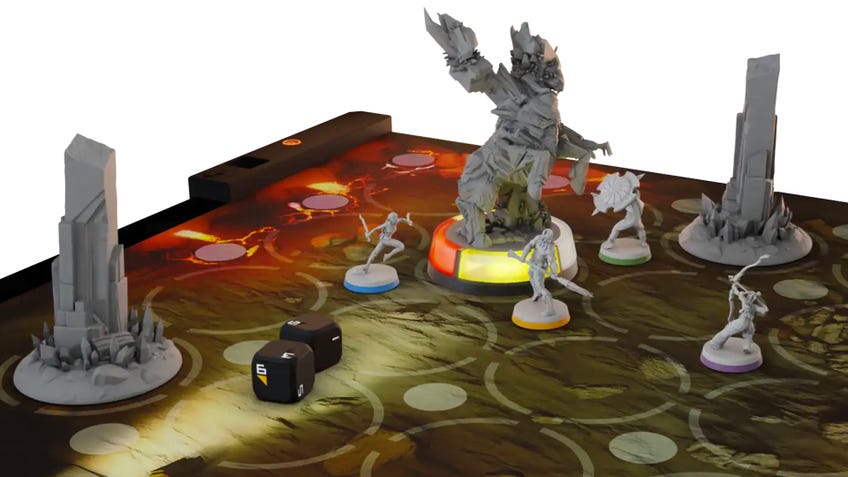‘My dream is to create the first massively-multiplayer tabletop RPG’
Teburu developer Xplored reveals its ambitions for the tech-enhanced board game platform.
Teburu was first revealed way back in 2019 as a highly ambitious meeting of tabletop board gaming and futuristic technology, promising to offer the best of the physical and digital worlds in a ‘board game console’.
Three years on - and five years since the project first started development - Teburu has hit Kickstarter with its first game, The Bad Karmas and The Curse of the Zodiac, which shows off the potential of the hybrid platform.
From automatically tracking the position of sensor-equipped miniatures on its board and controlling enemies through dynamic AI behaviour to calculating the rolls of ‘smart’ dice, Teburu is a technological leap beyond the likes of board game companion apps - while also attempting to retain the tangible pleasure of moving pieces around a board.
Bad Karmas looks to be just the start for Teburu, which already has additional games set in Vampire: The Masquerade’s World of Darkness and the fantasy lands of Sword & Sorcery planned for the future, bringing completely different experiences to the platform.
Davide Garofalo, CEO of developer Xplored, says that Teburu’s aspirations go even further, with ambitious hopes to bring online social features and massively multiplayer games to the board game console if it proves a success.
Ahead of the platform’s Kickstarter launch, we caught up with Garofalo to hear about the studio’s future plans for more games on Teburu - both brand new and familiar favourites - and how far its vision of hybrid board gaming could stretch.
As well as brand new IP and games, such as Bad Karmas, it’s exciting to consider how Teburu could enhance existing tabletop games - for example, Catan, Ticket to Ride or even Dungeons & Dragons. Are you able to discuss any plans to bring any popular titles to the platform in the future, and how they could be adapted to the hybrid format?
We already unveiled the first two partnerships we signed to bring World of Darkness and Sword & Sorcery to Teburu. They are indeed good examples of how both strong crossmedia gaming IPs and existing board game brands can match the Teburu system.
Not all games but most of the game genres can be adapted to the hybrid format. I’d define their porting to Teburu an “enhancement”, thanks to the many features and upgrades they gain. Some games will be almost the same but easier to play, more immersive and enriched by sound, AI, cinematics and remote gameplay. Other franchises instead suggest a new interpretation of the setting to take benefit of the system features.
During the long five years of development and conferences, we have had the opportunity to meet, talk and deal with the decision-makers of the renowned franchises you listed above and many others. Teburu is indeed an open platform. The first games are being developed by the Xplored team directly, being them on original or partners’ IPs. However, we are already onboarding well-known gaming brands to develop their own games, thanks to the Teburu SDK. This is just the beginning.

What game types are you most excited to support on the platform that we haven’t already seen - could Teburu support full roleplaying games, trading card games or even miniature wargames with many figures and terrain?
Teburu is an ideal system to enhance tabletop games, with maps, miniatures, dice, exploration and storytelling. That’s its main purpose. Nevertheless the system is designed to be modular and is already open to expansions and peripherals, and we already have some projects in our lab.
We’re already studying and exploring games based on permanent worlds affected by other players around the world.
Could you discuss the possibilities for online multiplayer and social connectivity via Teburu?
Yes! For sure, the Remote Gameplay feature is collecting a lot of attention and appreciation by the board gaming community. Everybody loves the idea to be able to play physical board games remotely with family and friends. But the opportunity behind the Teburu networking system and remote gameplay is huge.
We’re already studying and exploring games based on permanent worlds affected by other players around the world. Imagine that your party of adventurers explore a dungeon of the game world map, finding it already empty, with dead monsters and looted treasure. Then your heroes hear a noise from the next room. They enter and find themselves in front of another party of adventurers, controlled by real players who are playing the same game, in the same dungeon. What do you do? Talk, leave, attack? Sky and imagination are the only limits.

What are some of the most ambitious features and experiences you’d like to bring to Teburu in the future?
The Bad Karmas is already bringing a new level of AI for the enemies compared to today’s tabletop games. While analogue games offer a few conditional behaviours that players study and apply to control the enemies or a random deck of action cards to manage them, our Zodiacs’ intelligence is driven by the app in order to take aware, weighted, complex and contextual decisions to follow their own agenda and maximise the effect of their attacks on the battlefield against the heroes.
AI may even evolve in the future through a machine-learning approach, but it’s a future opportunity we’ll evaluate. Another interesting field is the hidden info/betrayal gameplay, with secret goals and hidden actions influencing other players actions and the whole public vs private game story. But the Teburu system has the potential to enhance many aspects of the game experience and our R&D team is exploring a few new frontiers right now.
Last but not least, as we said above, future features will surely focus on the community engagement and the online remote gameplay: my dream is to create on Teburu the first permanent world hosting a massive multiplayer tabletop RPG game.
The RFID technology that Teburu uses is fairly accessible and flexible. Do you plan to open up the Teburu platform to third-party creators in the future? Whether that’s players at home downloading print-and-play games or independent creators making hacks/mods - possibly using existing components from games, such as the figures from Bad Karmas.
Let’s divide the question into two topics. One: RFID is just one tech we use in Teburu. Many competitors based their platforms “just” on RFID multiplexed antenna, getting expensive tech for a wide board, so a low penetration on the mainstream market. Teburu technology has seven internationally registered patents, merging the features and benefits of RFID and magnets, printed electronics and innovative conductive materials, Wi-Fi and BLE.
Two: Teburu is an open platform. Even if the first few games are being developed by the Xplored team directly, we are already cooperating with second-parties who are going to develop their own games thanks to the Teburu SDK. Furthermore, our long term goal is to open the platform to independent creators, supporting them with our Teburu Developer Kit and Game Engine (already in development), so that any hobbyist game designer will be able to create new games and share them with the community.
Future features will focus on community engagement and online remote gameplay.
If the platform is successful, would you expect to release a later ‘generation’ of Teburu comprised of new hardware, or would the focus be on supporting the existing hardware with further software updates and new ways of using the underlying technology?
Our vision is a long-term plan that can be built only on our respect and reward of the early adopters that make it feasible. The second scenario you listed is the one we are aiming to pursue. That’s feasible thanks to the fact the Teburu core technology is based on few and simple elements, engineered to be reliable and durable. At the same time the system has been engineered to be modular and open to wired and wireless expansions and peripherals. So, the existing hardware will be enhanced by new coming upgrades.


